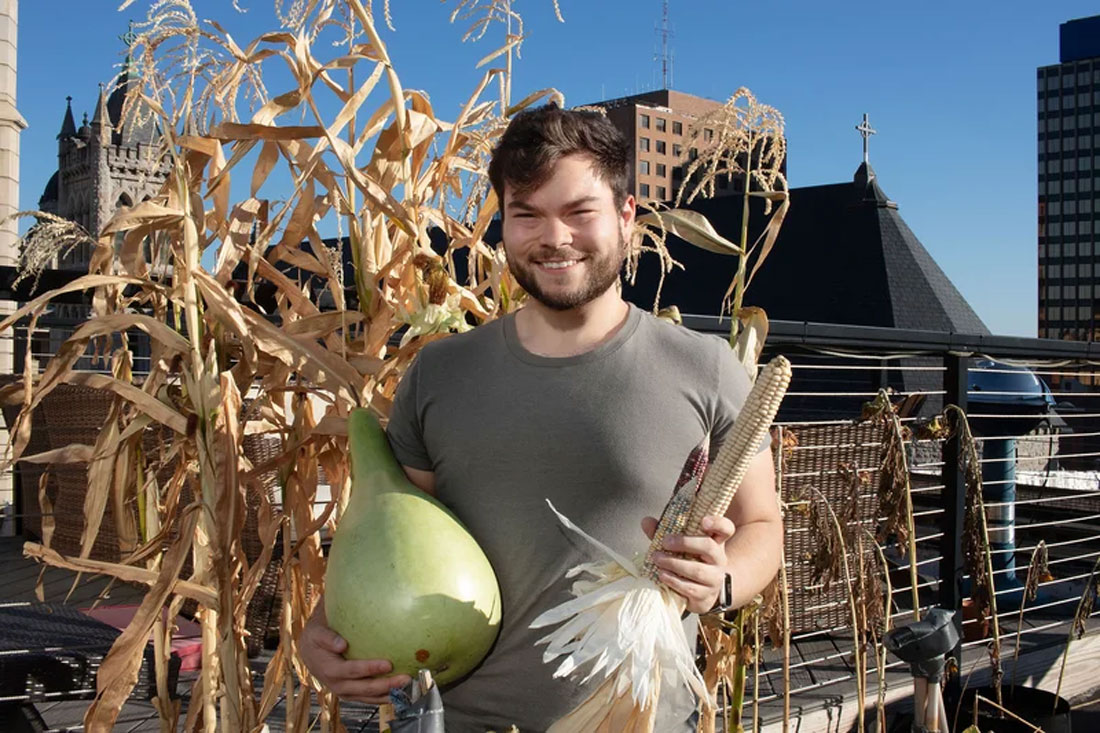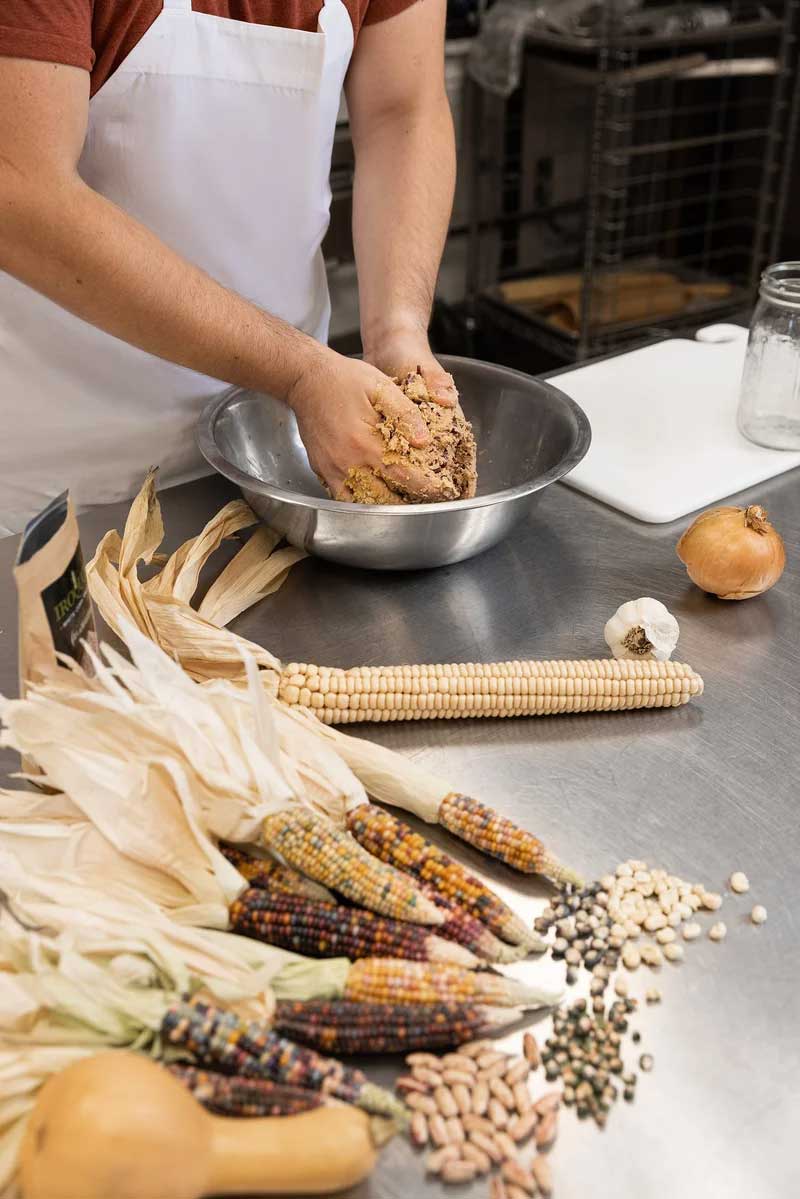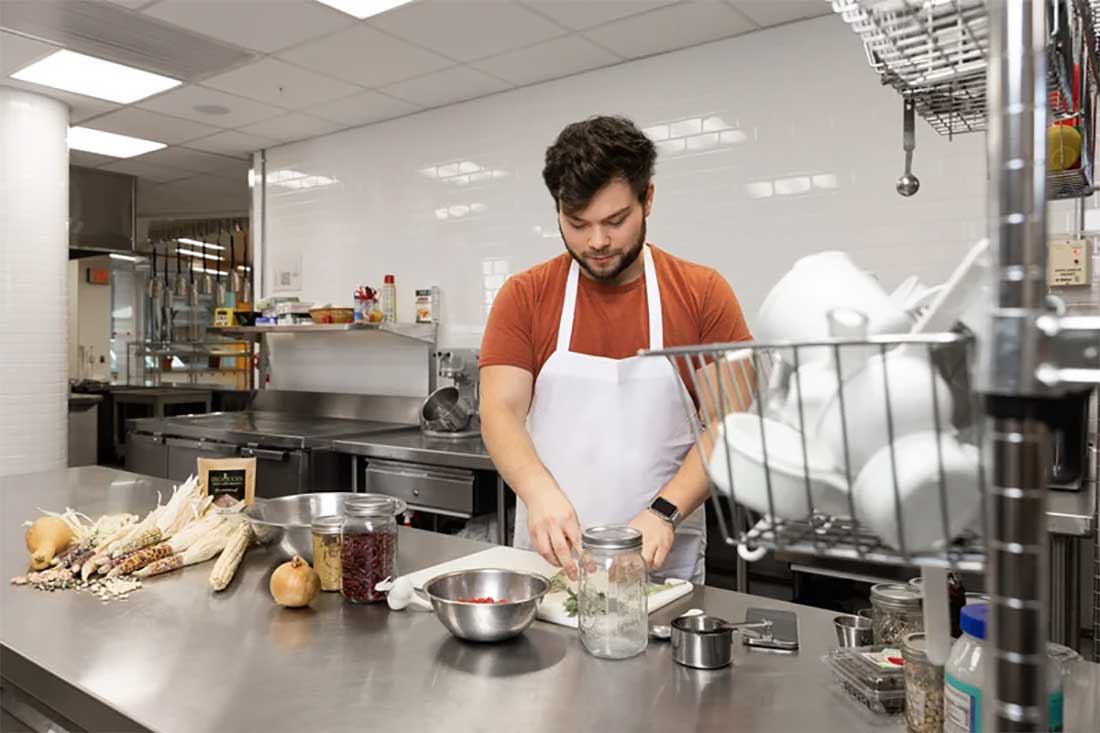
As a Syracuse University sophomore in 2015, Ethan Tyo ’17, G’23 was studying abroad in London when he decided to experiment with a plant-based diet. It was the beginning of a journey for Tyo, who went on to lose over 100 pounds in a year and a half and discover a passion for food. “It was about mental health, physical health, and becoming a new person,” recalls Tyo of his semester abroad.
Today, Tyo, a member of the Akwesasne Mohawk Tribe, is a food studies graduate student in the Falk College of Sport and Human Dynamics, where he’s combining his passion for food with an enthusiasm to educate others about his roots. From introducing a new garden on campus to becoming a published author, Tyo has utilized campus resources to create a more comfortable environment for the Indigenous community.

Growing up on Akwesasne Territory, which straddles the border between the United States and Canada in northern New York, Tyo didn’t have the resources to maintain a healthy diet. He explains that the nearest grocery store was a 25-minute drive from his home. When Tyo arrived at Syracuse University, suddenly fresh fruits and vegetables were readily accessible
Since then, Tyo has made it his mission to intersect his Indigenous roots with healthy dietary habits. For example, on South Campus, he planted a Three Sisters garden, which involves the Indigenous agricultural method of planting squash, beans and corn together to create a sustainable diet. In addition to Syracuse, he has initiated Three Sisters gardens at other nearby universities to help unite the Indigenous student communities and create opportunities for an underrepresented demographic on college campuses. Tyo’s influence has also earned national attention, as evidenced by his recipe for Three Sisters bean patties recently featured in The New York Times Cooking section.
It’s a fundamental goal of Tyo’s to incorporate Indigenous knowledge into campus life. “The purpose of the Three Sisters garden on campus was to create space for engaging with Indigenous activities while away from our home communities,” he says. “It’s a true land acknowledgment, and the first time Onondaga seeds have been returned to ancestral lands in this way. I believe this is a pathway to begin building relationships between Tribal communities and academic institutions whose ancestral land they inhabit today.”
While creating a more inclusive environment on campus, Tyo built a working relationship with Akwesasne leaders back on his home reservation. Tyo says he didn’t grow up very connected with his Indigenous peers, but he’s become closer with them since coming to Syracuse. He was unaware that many of the friends he made in college had grown up down the street from him.
From One Chapter to the Next

As an undergraduate, Tyo—who majored in information management and technology in the School of Information Studies—placed his focus on social media, personally and professionally. He documented his plant-based journey on Instagram and held internships working as a content strategist. “I learned how to be healthy, take care of myself and to balance lifestyle and nutrition,” he says. “How can I then document this, showcase it and learn from other people?” The answer began with social media. “A lot of my projects are like chapters, so social media was the first chapter of being able to change my lifestyle,” he says.
As one chapter closed, another opened. Returning to Syracuse to pursue a master’s degree in food studies, Tyo went back to doing what he does best: experimenting.
In his downtown apartment, Tyo pondered a question. “Is there a way we can grow food in food deserts, in urban areas, in weird spots like six stories in the air?” Without any knowledge of gardening, but with a handful of seeds, he attempted a rooftop garden. And in a recurring theme, it became a successful community garden where other residents could pick herbs, tomatoes and more. He also grew the Three Sisters there, trying out different seeds—keeping some for his collection and sending the extras back to his nation.
Last year, in a collaborative effort alongside friends and fellow graduate students, Tyo published the cookbook Fetagetaboutit, which weaves simple, plant-based recipes into a fictional story about Bobby Slay, a celebrity chef by day and superstar Master DJ by night. He wanted to create a nonconformist cookbook that could attract a younger audience while teaching the importance of sustainability and reducing food waste. “I wanted to compact down everything that I’ve been able to learn, live off and eat over the course of my plant-based journey up to then in my cookbook,” says Tyo, who curated most of the recipes.
Tyo produced the cookbook with guidance from the Blackstone LaunchPad—Syracuse University’s innovation community. Now, he’s a mentor with the LaunchPad, and he’s working with the creative community on another initiative, the AlterNative Project, which evolved out of his graduate practicum.
Spreading Seeds of Indigenous Knowledge
The AlterNative Project is an effort to engage people in experiences across the food system that are grounded in the Indigenous values of community, sustainability and land. “Indigenous food holds complex historic, cultural and theoretical value beyond books and stories. We need to understand this knowledge, so we can continue our ways,” Tyo says. “This project puts knowledge into action to educate and empower our communities.” For example, part of the reason he didn’t have a healthy diet growing up was the consequences of industrialism, he explains. PCBs, mercury and other harmful chemicals flooded the rivers feeding into Tyo’s reservation, leading to “poisoned land” and making it unsafe to naturally grow food there, he says.
The U.S. Environmental Protection Agency (EPA) established several Superfund sites for the St. Lawrence River area, which includes the Akwesasne Territory. The objective includes the “remediation of hazardous waste sites and contaminated sediments, and source control activities,” according to the EPA. Since 1987, there has been an ongoing effort to improve water quality in and around the St. Lawrence River area, but the restoration process is far from over. “We’re not able to fish in our rivers because of industrial plants,” Tyo says. “We had four or five industrial plants that were built upstream from us.”
The purpose of the Three Sisters garden on campus was to create space for engaging with Indigenous activities while away from our home communities. It’s a true land acknowledgment, and the first time Onondaga seeds have been returned to ancestral lands in this way.
The AlterNative Project seeks to shed light on such issues through educational efforts. For instance, Tyo worked with the Native Student Program to create a series of workshops and events around traditional Haudenosaunee foodways, including the Three Sisters garden dedication. This work has led to collaborations with academic departments at Syracuse to infuse Indigenous knowledge into curricula as well as establishing cultural sites at neighboring universities and partnering with museums. “Museums can protect and preserve traditional knowledge for future generations—with the long-term goal of developing tribal food system projects and opportunities to build resilience and food sovereignty back home,” he says.
It’s one of the many goals for Tyo in this very busy chapter of his life. Alongside Angela Ferguson, a member of the Onondaga Nation and a legend in the realm of Indigenous preservation, he will be working with the Adirondack Experience Museum on a cultural installation. Tyo will also head to the Museum of Natural History in New York City with Ferguson in the spring to demonstrate the revitalization of Indigenous agricultural and dietary methods through the Three Sisters gardens.
Several years ago, Tyo made the snap decision to change his relationship with food. Little did he know it was the first chapter in a story that is far from over. He is just scratching the surface of his long-term mission to fuse his knowledge of food with his Indigenous heritage to create awareness and a sense of community.
“Who knows what the potential is for these gardens?” Tyo says, gazing at a corn stalk rising a couple of inches above his head. “I’ve made my roots here.”
Cameron McKeon
Original story was published on January 24, 2023.
